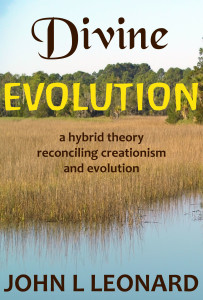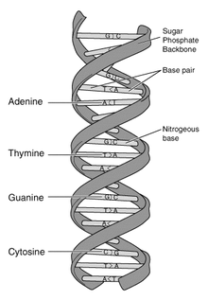[AUTHOR’S NOTE: Fourth installment in the series of articles originally published as the Atlanta Creationism Examiner about existential questions and the theory of evolution.]
buy cheap isotretinoin online  Iterative creation
Iterative creation
A new Facebook friend sent me a link to an article by a scientist advocating his version of Divine Evolution, another reason I now think iterative creation might have been a better name for my own personal philosophical beliefs.
Stuart Kauffman wrote in the Edmonton Journal,
I believe that we no longer need a Creator God, we need God’s creativity.
In other words, Kauffman believes in a form of theistic evolution ala Francis Collins, where we have a creator God who doesn’t really do anything but get the ball of evolution rolling, more deist than theist.
Creation theory is concerned about the origin of things. If there is reason to believe that a supernatural entity of extraordinary intellect caused our universe to happen, why not believe that same Creator is directly responsible for the origin of life? Why would God put in all the work to set up the universe for life but lose interest before creating it? What exactly are we saying here? Do “we” believe that God suffers from some sort of Attention Deficit Disorder, or what?
The so-called facts of evolution and the scientific evidence used to support my hypothesis of iterative creation are one and the same.
The conjecture about evolution is where the theories significantly differ. Iterative creation begins with a bang. Actually, it begins with the Big Bang. The Big Bang Theory makes sense, mostly because scientific evidence like redshift and CMB support it. It only leaves us with one real question: from where did the matter come?
Matter “exploded” with such great ferocity that the expansion of the universe began over 14 billion years ago continues to this day. How long was this dense, hot clump of pre-matter just sitting around before it decided to create the universe? It’s interesting to note the Bible reports in the first chapter of Genesis that God spoke and said, “Let there be light.” The Bible is claiming that God created matter to create our universe — simply by speaking.
I’ll be the first person to admit, that sounds pretty hard to believe — pun intended. But science tells us that plants turn into people once enough time passes, without any sort of help. Is that really easier to believe than an invisible God? Additional information offering very compelling support for belief in a supernatural God is readily available and has been reported upon previously, but my argument to support belief in a supernatural creator is best left for the next article, titled Supernatural evidence.
Science tells us light equals energy. Energy equals matter. The Bible is essentially telling us that the first thing God created was matter. That makes perfect sense. You can’t make anything without raw materials. This universe, ideal for producing abundant life on Earth, is unbelievably improbable. Physicist Sir Martin Rees could tell you all about Just Six Numbers. He and most other cosmologists agree these cosmological values show how remarkably improbable it is that our universe originated by sheer luck or random chance.
In an article for American Thinker titled “Does science refute God?”, Vasko Kohlmayer presented the cosmological or First Cause argument favoring belief in a creator God. The Kalam Cosmological Argument goes as follows:
http://childpsychiatryassociates.com/treatment-team/debra-newman Everything that begins to exist has a cause.
The universe began to exist.
Therefore, the universe must have a cause.
This universe is required before we can get to the origin of matter.
The only answer Richard Dawkins seems to have mustered in response to the First Cause argument uses circular logic; he insists if God created the universe, then somebody must have created God. His argument completely ignores any concept of eternity. More recently he’s also entertained the notion Lawrence Krauss asserts, that an invisible creator God is preposterous, but quantum mechanics shows us that a universe from nothing created by invisible particles is easily believable.
Once matter, stars, and planets exist, complex chemical elements become stardust that sprinkles over the Earth. These chemical elements are essential to form life. Who knew Joni Mitchell was right? She wrote the lyrics, We are stardust, we are golden, we are billion year old carbon. She’s obviously a very smart woman. And her song begins: Well I came upon a child of God…
Stars are like cosmic volcanoes, spewing essential chemicals absolutely necessary for life into the universe. These chemical elements bond to form molecules, which in turn combine to form nucleotides.
Following specific rules of recombination for nucleotides, “Lego” like building blocks assemble genes sequenced together into a unique single DNA strand of six billion coded instructions, all residing within a single living cell. That does not happen by accident or random chance, my friend.
Richard Dawkins first advocated his theory of replicators in his book The Selfish Gene. It’s a simple theory: replicators are “anything in the universe of which copies are made.”
Iterative creation asserts that replicators do not really exist, because nature does not produce carbon copies of anything. This information is easily observed using the tools of modern science. Every living organism is unique, conforming to a specific genetic blueprint.
Replication makes exact copies. However, very human has unique DNA. Every human has unique fingerprints. Each finger has a unique print.
Unique DNA is not limited to humans. According to science, any dog on the planet may be identified by DNA found in his poop.
DNA is really amazingly organized information, if you think about it. 
We have learned through analysis of DNA culled from various organisms that each distinct morphological type has a unique pattern, and within that pattern each individual has a unique algorithm that differentiates that creature from every other known creature on Earth.
Evolution theory is only assumed true (and we recently learned that making flawed assumptions often leads to erroneous conclusions) because we know a very few “facts” and extrapolate beyond the limits of imagination simply because of the perception there isn’t viable alternative in the form of competing theory. That’s only because iterative creation hasn’t been seriously considered by anyone (but me) to date. Creationism in general is treated synonymously with Young Earth Creation (YEC), which cannot be true if the scientific tests we know as radio carbon dating are accurate for the first 50,000 years. Iterative creationism is not constrained by time.
Furthermore, the fossil record contains every indication that modern life is quite different from earlier and more ancient life forms. Unless the Bible references to “leviathan” and “behemoth” are references to dinosaurs, it’s reasonable to assume the Bible omitted mention of dinosaurs because its writers were unaware of its existence. As far as we know, mankind wasn’t around when dinosaurs ruled the earth.
But is it reasonable to assume humans descended from dinosaurs through a number of intermediate stages when the only means of produced a new generation was sexual reproduction?
The argument about the Bible and YEC is irrelevant to iterative creation. The value of Noah isn’t when it happened or whether the flood actually occurred according to the geological record, but the important fact to realize is that the Bible is reporting an incident of mass extinction.
Creation theory is often mocked by atheists because God is perceived as magic. Its critics are quick to point out perceived errors and contradictions in the Bible and point out that the six days of creation are demonstrably untrue. Assuming radio carbon dating is anywhere close to accurate. I’m prepared to assume the margin of error is not plus or minus several billion years. Yet in evolution theory, time itself is magic.
Please consider this simple, elegant alternative to YEC (Young Earth Creationism) and Darwinian evolution: after creating the universe by speaking in the Big Bang anomaly, God formed the first living organism, solving the problem of abiogenesis (we have no idea how it happened.) The breath of life from a supernatural Creator caused inanimate matter to become animated. It’s much more logical to believe the origin of life happened on purpose than by accident. Iterative Creation also solves the “insufficient time” problem for DNA to form, eliminating the need for silly hypotheses like panspermia to move the problem of life off the Earth to give DNA more time to evolve. Simple life came first in order for the building blocks to come in proper sequence. Plants had to precede animals because animals need plants for food, to produce oxygen, shade, etc. Interestingly, the order in which life emerged in the Bible according to Genesis Chapter 1 essentially matches the fossil record.
God made a blueprint, sexually paired the creature with male and female, and continued creating. Iterative creation hypothesis differs from biblical teaching in that life is not believed to be “perfect” from the onset as created by a perfect Creator, but more like a divine experiment. Each day of creation was not delineated by the revolution of the Earth on its axis, but punctuated by a period of extinction. Therefore, by human standards, our “experiment” and God’s “day of rest” may have only started between 6,000 – 10,000 years ago, but the Earth may have formed much earlier.
Why say “may” instead of “was?” Because I don’t know with absolute certainty when the Earth was created. I know that a consensus of scientists agree that the planet is around 4 billion years old, but I also realize that these are experts who believe they know certain things, not unlike how I believe that I know God exists.
 The creator God artiste periodically cleaned the palette of creation and formed new life. The biblical account implies perfection of God is reflected in the finished product of creation. Dinosaurs were simply models, or prototypes, if you will. Why do we assume each animal form is a “one and done” proposition?
The creator God artiste periodically cleaned the palette of creation and formed new life. The biblical account implies perfection of God is reflected in the finished product of creation. Dinosaurs were simply models, or prototypes, if you will. Why do we assume each animal form is a “one and done” proposition?
A perfect creator is not required to create perfectly. Six mass extinctions create problems for evolutionary biologists – a lot of chlorine gets periodically poured into the gene pool.
Evolutionists proposed a theory called punctuated equilibrium or explosive evolution to explain the rather obvious periodic episodes of eradication and renewal.
The problem with punctuated equilibrium is that the theory strongly implies innate intellect is somehow programmed into our DNA. When asked directly how species came to rapidly diversify and repopulate the Earth with new organisms in what scientists term “the Cambrian explosion”, evolution expert Dr. Michael Ruse suggested that the remaining organisms somehow recognized environmental niches existed and evolved to fill them. With all due respect for Dr. Ruse, that sounded remarkably flippant, and not unlike the ridiculous plot in one of my favorite Monty Python skits.
I wish I’d been ready to propose my hypothesis of iterative creation as an alternative at the time.
The overall weakness of secular evolution is that obvious interdependencies must be denied so that theory can be separated from hypothesis and conjecture. Therefore evolution theory is unconcerned with abiogenesis.
Conversely, iterative creation acknowledges that the Big Bang, abiogenesis, speciation and natural selection must be explicable in order for life to exist.
My theory asserts this occurs when God creates a base pair of “species” (a term abused and bastardized by scientism advocates to muddy the waters). God didn’t have to individually create polar bear, grizzly bear, sun bear, etc. He only needed to create the genetic blueprint for bear in male and female form. Afterward nature could take its course.
God created the dinosaurs. Then God apparently decided he didn’t like them and essentially wiped them off the face of the Earth. Given the awesome power required to perform a supernatural act of creation (or destruction), I’d have to say it’s God’s prerogative. It seems logical to assume, after five major extinctions followed by emergence of almost exclusively new life forms, that some sort of divine plan is being executed to perfection.
It’s perfectly natural to believe God, the very creator of Nature, would use natural means to perform supernatural feats. In fact, a future article will offer natural explanations for the ten plagues of Egypt. God may work in mysterious ways — why not use natural methods?
Does it make sense that God might use evolution to shape new life from existing DNA? I suppose God does not have to actively create new creatures because he created a purposeful vehicle called sexual reproduction to accomplish His work without intervention.
Even variations within a morphological form occur; we call them ring species. Perhaps even mutations beyond what should be considered a species are possible. If the term species actually still meant something, we might be able to tell. Only God can say how he created life. Humans simply don’t live long enough to witness a mass extinction and the emergence of new life. The only thing we really know is that life exists.
Life is remarkable, diverse, wondrous, and incredibly resilient.
Apparently by design.

Speak Your Mind